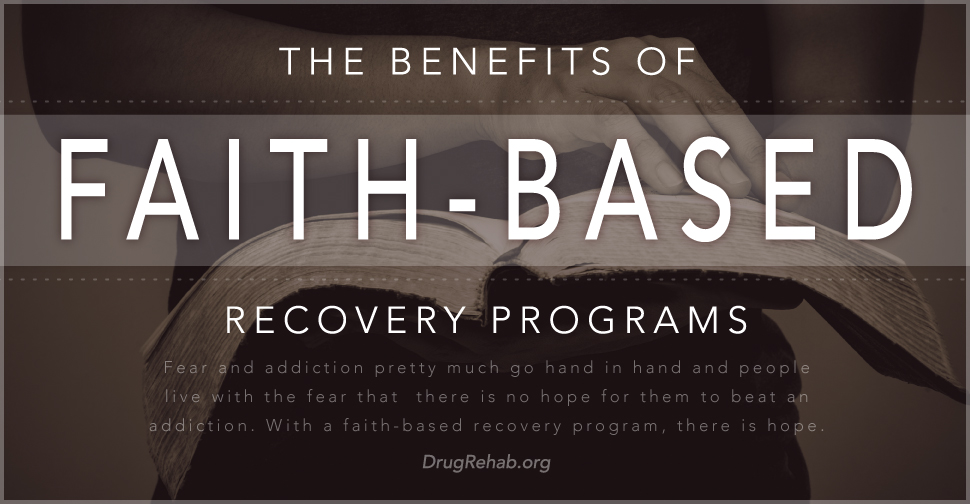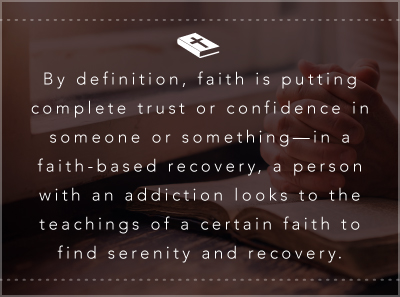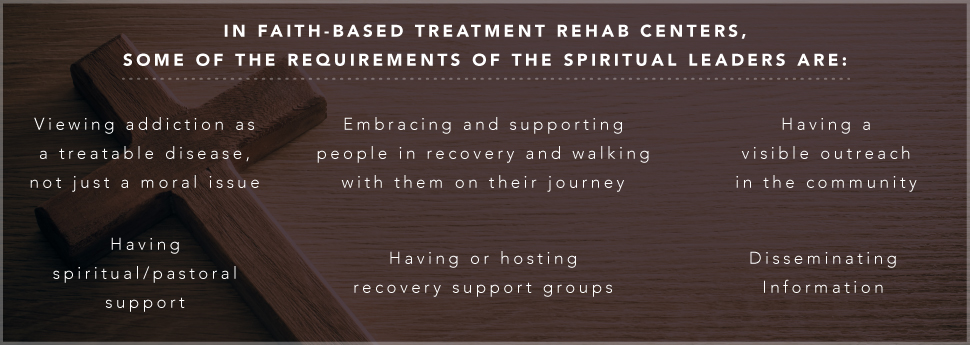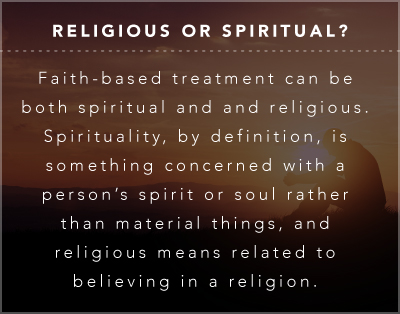
Fear and addiction pretty much go hand in hand and people live with the fear that there is no hope for them to beat an addiction. With a faith-based recovery program, there is hope. These recovery programs give people who suffer from addictions a higher power to look up to—and be reassured that they haven’t failed morally, because what they have is a disease. Faith-based recovery programs can help someone overcome a pornography addiction, alcohol addiction, drug addiction, or other behavioral addictions. With a faith-based program there can be hope for a brighter tomorrow.
Have you ever suggested that a person seek help for a drug or alcohol problem; only to have them tell you that they didn’t need help? Perhaps you suggested they try a program like Alcoholics Anonymous or Narcotics Anonymous—almost invariably they told you that they weren’t “like those people.” Could that answer have been a result of fear and lack of faith? Maybe your friend was afraid that they’d find out that they were like those people, or that they did have a drinking and drugging problem.
Addiction—Faith In Nothing
A lot of people with addictions have little faith in the idea of recovery—or little faith that there’s a such thing as a higher power. Actually lot of people who are active in an addiction to alcohol or drugs don’t have faith in much; it’s possible that they feel neglected by God, by their family, and may support a variety of other secular beliefs as well. Maybe they’re going around with a chip on their shoulder because they’re stuck with a drug or alcohol dependence, but everyone else doesn’t.
What Is Faith-Based Recovery?
By definition, faith is putting complete trust or confidence in someone or something—in a faith-based recovery, a person with an addiction looks to the teachings of a certain faith to find serenity and recovery. For instance, in a Christian-based recovery, a person would likely look to the teachings of Christ in the New-Testament of the Bible, whereas a person who practices Judaism (Jewish-based) would more likely use the Torah.

Thanks to community outreach organizations like Faith-based and Community Initiatives, treatment centers can provide people with shelter if they’re homeless or might become homeless; they can also inform teens and young adults about drug and alcohol addiction, or even provide crisis counseling for people who have experienced trauma.
What Kind Of Treatment Is Faith-Based Recovery?
Essentially, faith-based recovery and support is “an opportunity for places of worship and fellowship to support and strengthen families in their communities by offering recovery programs to help individuals beat their addictions” (Department of Mental Health and Substance Abuse Services). Faith-based recovery can work in several areas of treatment: Mental health services; substance use prevention; and addiction treatment just to name a few (SAMHSA). Not only can it work for addictions, faith-based recovery can help a person suffering from mental health disorders as well.
These types of recovery programs can look differently based on what type they are—faith-based treatment can be inpatient or outpatient, group or individual, long-term or short-term, but the main point of each is to help people in need. Sometimes a faith-based treatment will be used in criminal justice to revolutionize the way a convict thinks; and faith-based treatment methods can often be found in prisons, jails, or other community corrections facilities.
What Kind Of Addictions Can A Faith-Based Rehab Treat?
As previously mentioned, faith is something that a lot of people with addictions don’t have—so how do they get it? Sometimes it’s hard to put any kind of faith in something you can’t see, especially when you’ve been dealt such a bad hand. Perhaps you come from a long line of alcoholics, or addicts. There is hope, and a faith-based option can treat more than one kind of addiction—they can treat:
- Alcohol Addiction
- Heroin Addiction
- Cocaine Addiction
- Prescription Drug Addiction
- Pornography Addiction
- Gambling Addiction
- Methamphetamine Addiction
- Food Addiction
And more..
What Can A Faith-Based Recovery Program Do For People?
Faith-based recovery programs help people realize that they aren’t alone in addiction—and if they place their trust in someone else or in God, they can beat addiction. It all starts with a willingness to admit that there’s a problem. In faith-based treatment rehab centers, some of the requirements of the spiritual leaders are:
- Viewing addiction as a treatable disease, not just a moral issue
- Embracing and supporting people in recovery and walking with them on their journey
- Having a visible outreach in the community
- Having spiritual/pastoral support
- Disseminating Information
- Having or hosting recovery support groups
(Department of Mental Health and Substance Abuse Services)

You aren’t going to be shunned or disgraced because you have an addiction. You’ll be supported, cared about, and encouraged to do the best you can. Placing all of your trust in one person or idea can be pretty difficult if you’ve never seen it work for you, but if you can see the miracle in someone else, you’re more likely to believe that it can work for you. Not only can you feel like you’re worth fighting for, but through a faith-based recovery, you can feel like you have a purpose—and your quality of life can become so much better.
How Many Faith-Based Recovery Programs Are There?
There isn’t an exact number of faith-based recovery programs available, because faith-based recovery can be hosted by churches, sober living homes, rehab centers, and 12 step-programs. But one thing that’s certain: In the United States, with more than 60,698 groups and over 1,200,000 members in Alcoholics Anonymous, and about 50 other programs modeled after the original 12-step model (with just about every addiction you could imagine); there’s a faith-based recovery program available for just about everyone.
What Is A 12-Step Program?
A 12-step program is a way for a person to use fellowship, unity, and recovery to understand why they’re addicted, learn how other people fight addictions, and how to stay sober. It’s about realizing that there is a God, and you’re not it.
According to an article in the United States National Library of Medicine, “Twelve-step fellowships (e.g., Narcotics and Alcoholics Anonymous) are the most widely available addiction recovery resource in the United States. Affiliation with 12-step fellowships, both during and after treatment, is a cost-effective and useful approach to promoting recovery from alcohol–and other drug-related problems.”
Is Faith-Based Treatment Religious Or Spiritual?
Faith-based treatment can be both spiritual and and religious. Spirituality, by definition, is something concerned with a person’s spirit or soul rather than material things, and religious means related to believing in a religion. AA claims to be a spiritual program, however, based on the 12 steps, members are also encouraged to practice praying to a “God of their understanding.” Not to twist things up too much; spirituality and religion can, but don’t always, have some of the same ideas.

What Is Addiction?
According to the National Institute on Drug Abuse, “Addiction is a chronic disease characterized by drug seeking and use that is compulsive, or difficult to control, despite harmful consequences. The initial decision to take drugs is voluntary for most people, but repeated drug use can lead to brain changes that challenge an addicted person’s self-control and interfere with their ability to resist intense urges to take drugs.” Along with health, financial stability, and social life, addictions can control a person’s behavior, learning, judgment, memory, and decision-making.
How To Get Help With An Addiction
There are a lot of things to be afraid of if you’re suffering from an addiction, or struggling with an emotional or mental disorder—fear of rejection, fear of overdose and death, and fear that you’ll never get the treatment you need. If you’re living in fear and suffering from an addiction; it’s time to step out of the shadows and contact us. We can show you to the light, and help find the recovery program that’s right for you. It’s time to “let your faith be bigger than your fear.”
For More Information Related to “The Benefits of Faith-Based Recovery Programs” Be Sure To Check Out These Additional Resources From DrugRehab.org:
- Power of a Spiritual Path
- Is A Higher Power Necessary To Recover From Addiction
- The Spiritual Aspect Of Recovery
- How Long Does Methamphetamine Stay In Your System
- Alcohol Addiction Quiz
- Are Sober Living Homes Effective?
Sources
Alcoholics Anonymous – Estimates of A.A. Groups and Members as of January 1, 2016
Department of Mental Health and Substance Abuse Services – Join Our Faith-Based Recovery Network
National Institute on Drug Abuse – Understanding Drug Use and Addiction
Substance Abuse and Mental Health Services Administration- SAMHSA – About Faith-based and Community Initiatives
United States National Library of Medicine – The Role of Social Supports, Spirituality, Religiousness, Life Meaning and Affiliation with 12-Step Fellowships in Quality of Life Satisfaction Among Individuals in Recovery from Alcohol and Drug Problems


